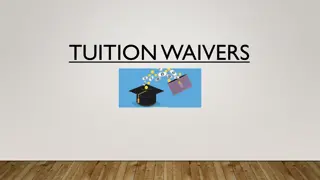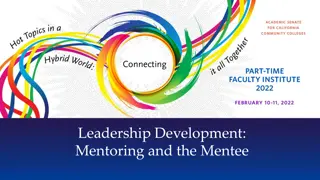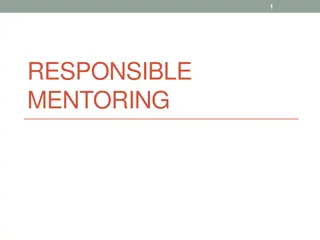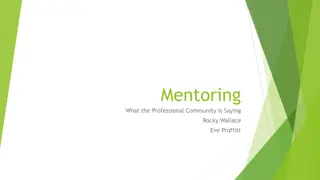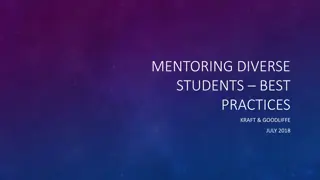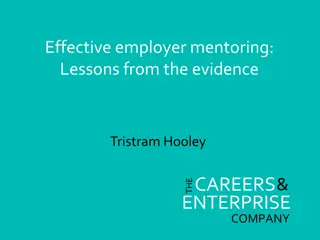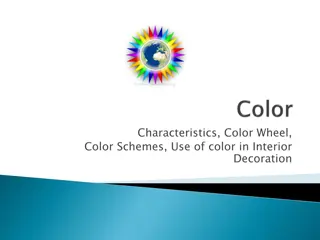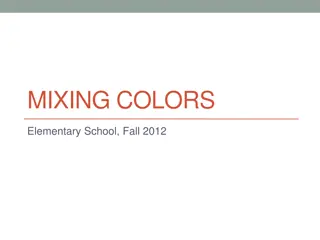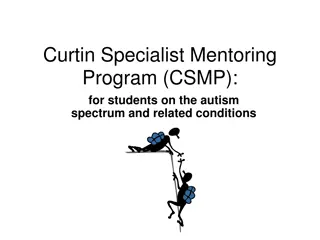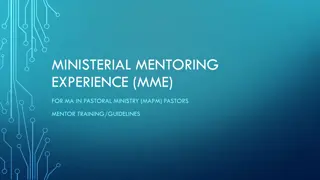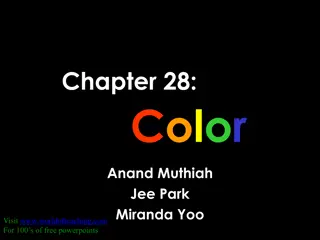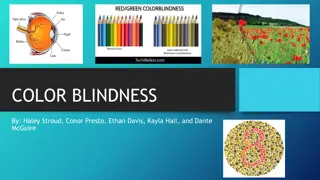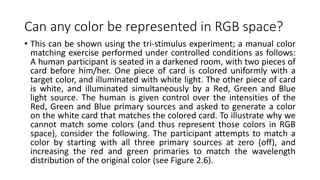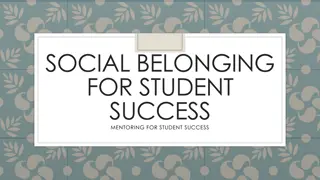Mentoring Graduate Students of Color: Key Insights and Best Practices
Delve into the timely topic of mentoring graduate students of color with insights from Dr. Stephany Santos and Dr. David G. Embrick. Explore the importance of good mentoring, challenges faced by graduate students, and what they desire versus what they actually receive. Gain a deeper understanding of the experiences, stressors, and uncertainties encountered by graduate students, along with their expectations from mentorship.
Download Presentation

Please find below an Image/Link to download the presentation.
The content on the website is provided AS IS for your information and personal use only. It may not be sold, licensed, or shared on other websites without obtaining consent from the author.If you encounter any issues during the download, it is possible that the publisher has removed the file from their server.
You are allowed to download the files provided on this website for personal or commercial use, subject to the condition that they are used lawfully. All files are the property of their respective owners.
The content on the website is provided AS IS for your information and personal use only. It may not be sold, licensed, or shared on other websites without obtaining consent from the author.
E N D
Presentation Transcript
TIMELY TOPICS Mentoring Graduate Students of Color Presented February 2, 2023
INTRODUCTIONS Dr. Stephany Santos, Assistant Professor in Residence, Biomedical Engineering; Director, Vergnano Institute for Inclusion; and Office for Diversity and Inclusion (ODI) Affiliate Dr. David G. Embrick, Associate Professor in Sociology and Africana Studies; Director, Research on Resilient Cities, Racism, and Equity (UConn Hartford); and Office for Diversity and Inclusion (ODI) Affiliate
ITINERARY 1. 2. 3. 4. 5. What do we know? Experiences of Graduate Students Experiences of Graduate Students of Color Challenges of Mentoring Best Practices toward Better Mentoring
WHAT DO WE KNOW? 1. Studies indicate, overwhelmingly, that good mentoring is one the best predictors of graduate student success 2. Mentoring (good mentoring) varies by discipline and department, but in general, units are inconsistent when it comes to equitable and consistent mentoring of graduate students; for many graduate students, it is the luck of a draw whether they can find a good mentor 3. Rewards for good mentoring are often individual-based; however less attention is paid to how the unit (e.g., department) can do a better overall job in mentoring its graduate students 4. Academia, in general, does not do a good job of mentoring graduate students of color
EXPERIENCES OF GRADUATE STUDENTS 1. High Stress (finances, performance, expectations, goals) 2. Insecurity 1.*feelings of inadequacy 2.*lack of training/professional development 3. Uncertainty 1.*about the job market (prospects) 2.*about being fitting in with academia
WHAT THEY WANT VS WHAT THEY GET According to the longitudinal Academic Life Project that surveyed 2000 graduate students (using a nationally representative sample) starting in 1994 and continuing every three years...graduate students pursue higher education: 1. ...out of a desire for knowledge in the field 2. To do research 3. To teach 4. To benefit others through their work There is data to suggest that many graduate students view their department climate as largely positive but this varies by discipline, funding levels, strength of cohort, etc.
HOWEVER... Graduate student views of department climate are not indicative of good mentorship. In general, many graduate student feel they did not receive the mentoring they wanted (Austin 2002) What do graduate students want? 1. More mentoring, advising, and feedback 2. Structured opportunities to observe, meet, and talk with peers 3. Diverse teaching opportunities 4. Information and guidance 5. Regular and guided reflection
GRADUATE STUDENTS OF COLOR... .face the same challenges, emotions, desires/needs as their white counterparts
EXPERIENCES OF GRADUATE STUDENTS OF COLOR 1. 2. 3. 4. 5. 6. Lack of Integration and Sense of Belonging Isolation Mental Health, Health, and Coping Identity (more intense forms of imposter syndrome) Fear of Retaliation The Deleterious (and cumulative) Effects of Racial Micro and Macroaggressions Gaslighting Lack of Mentoring, i.e., providing guidance through academia, the degrees, networking, or in developing critical professional skills 7. 8.
MENTORING GRADUATE STUDENTS OF COLOR The data is clear when it comes to mentoring students of color in higher education historically excluded and racially oppressed students in academia do not receive good mentorship in comparison to their white counterparts. 1. 2. 3. They are less likely to receive adequate support for their research They are less likely to be taken seriously as academic scholars They are less likely to be included in collaborative projects with faculty (or even with their white peers) They are less likely to be included in networking opportunities They are less likely to have a sense of belonging 4. 5.
BEST PRACTICES IN MENTORING STUDENTS OF COLOR Mentoring can be intentionally planned as a partnering relationship. Deficit Language: You are my GA and I can fund you with this grant Asset Language: I am because we are (Ubuntu)
BEST PRACTICES IN MENTORING STUDENTS OF COLOR Mentoring can be intentionally planned as a partnering relationship.
BEST PRACTICES IN MENTORING STUDENTS OF COLOR An effective mentor need not share the students experiences and feelings, but they should be aware of and sensitive to them. Asset Language: You get to learn the most effective way to learn from academic papers! Deficit Language: You don't know how to read a paper!? Assumptions of knowledge or experience . For example, assumptions on "How to read an academic paper"
DEFICIT LANGUAGE IS DEMORALIZING How does what I say affect my student's Imposter Syndrome? How does what I say affect my student's Internalized Oppression?
BEST PRACTICES IN MENTORING STUDENTS OF COLOR Mentoring roles should be defined and revisited often. Asset Language: Here s the domains I d love to contribute to towards your success Deficit Language: I can t help you look on the website
ROLE UNCERTAINTY IS DEMORALIZING How does what I say (or don t) affect my student's Imposter Syndrome? Am I allowing careerism/time constraints to govern this mentoring? How does what I say (or don t) affect my student's Internalized Oppression? How am I encouraging a feedback loop?
BEST PRACTICES IN MENTORING STUDENTS OF COLOR Feedback should be given and sought by both parties regularly. Asset Language: Are we meeting at a frequency that supports your needs? Deficit Language: You re good, right?
INADEQUATE AND INAPPROPRIATE FEEDBACK IS DEMORALIZING How does what I say affect my student's Imposter Syndrome? Am I operating on a precedence or how it s been for others? How does what I say affect my student's Internalized Oppression? How am I affirming my student?
BEST PRACTICES IN MENTORING STUDENTS OF COLOR In particular, [many] Black and Latine/x students seek work and careers that integrate social justice, empathy, and equity matters. Asset Language: It would be a great opportunity for you to present at the NSBE conference. Deficit Language: Your research comes first.
DISMISSING CULTURAL NEEDS IS DEMORALIZING How does what I say affect my student's Imposter Syndrome? How do we integrate equity and social justice into our research group values? How does what I say affect my student's Internalized Oppression? How do I promote affinity-based programs and events?
BEST PRACTICES SUMMARY 1. 2. Mentoring can be intentionally planned as a partnering relationship. An effective mentor need not share the students experiences and feelings, but they should be aware of and sensitive to them. Mentoring roles should be defined and revisited often. Feedback should be given and sought by both parties regularly. In particular, [many] Black and Latine/x students seek work and careers that integrate social justice, empathy, and equity matters. 3. 4. 5. Grounded by: 1. How does what I say affect Imposter Syndrome? (individual level) 2. How does what I say affect Internalized Oppression? (systems level)



